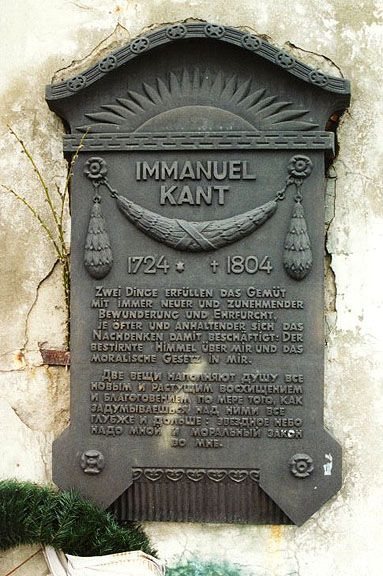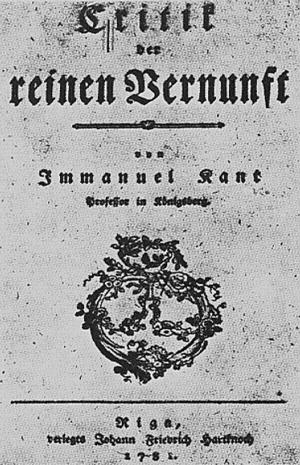Immanuel Kant
German philosopher, b. 22 April 1724 (Königsberg, Prussia [today's Kaliningrad, Russia]), d. 12 February 1804 (Weimar, Germany).
 Kant's parents were devout members of the pietist Lutheran church, which promulgated a simple life and adherence to the inner moral law. His father was a saddler; his mother an intelligent woman without formal education. When Immanuel was eight years old he entered the Latin school run by the church. In 1740 he enrolled in the University of Königsberg to study theology.
Kant's parents were devout members of the pietist Lutheran church, which promulgated a simple life and adherence to the inner moral law. His father was a saddler; his mother an intelligent woman without formal education. When Immanuel was eight years old he entered the Latin school run by the church. In 1740 he enrolled in the University of Königsberg to study theology.
But Kant was more interested in science. He read the works of Isaac Newton and began in 1744 to write his first book on problems of physics. In 1746, however, his father died, and Kant had to leave university and support himself by working as a private tutor. The wealthy families for whom he worked introduced him to the higher society of Königsberg, and once he accompanied his employers on a trip to Arnsdorf. It was the biggest trip of his life, a distance of 96 km, after which he never left his home city again.
In 1755 Kant was able to complete his degree and obtain employment as Privatdozent (lecturer) at the university. He lectured in mathematics and physics, but in his research he was interested in comparing the methods of science, particularly Newton's method of investigation, with the methods of thought applied in philosophy.
After two unsuccessful attempts to obtain a professorial position, the rejection of offers from other universities and 15 years as a Privatdozent Kant was finally appointed professor of logic and metaphysics in 1770. In his inaugural dissertation he layed out his project: to explore the philosophical territory through scientific methods. It took him more than ten years, during which time he did not publish anything; but he was sure of the success of his quest. In a letter to a friend he wrote about his dissertation:
- "About a year since I attained that concept which I do not fear ever to be obliged to alter, though I may have to widen it, and by which all sorts of metaphysical questions can be tested in accordance with entirely safe and easy criteria, and a sure decision reached as to whether they are soluble or insoluble."
In 1781 Kant published the first of three books entitled "Critique". The Kritik der reinen Vernunft ("Critique of Pure Reason", dedicated to Francis Bacon) was followed in 1780 by the Kritik der praktischen Vernunft ("Critique of Practical Reason") and in 1790 bei Kritik der Urteilskraft ("Critique of Judgement"). Rather than emplying criticism of existing philosophical teachings, "Critque" in Kant's sense meant the critical development of a system of thought from the ground up. To achieve this he proposed to follow "the sure path of science", which begins with a few laws of nature that cannot be proven or disproven and proceeds to discover the consequences. Just as physics accepts space and time as given, he says, so metaphysics has to start from certain principles and derive all other knowledge from them.
In contrast to the clear words in which Kant expressed the plan of his undertaking, his books are very difficult to follow and are not widely read except for philosophical study. But the rise of science in Europe posed a great challenge to philosophy and theology, and Kant was the most successful of all philosophers who responded to this challenge. Although his thoughts were not accepted unaltered by the next generation of philosophers, he is rightly considered the third father, after Plato and Aristotle, of European philosophy.
Reference
Bird, O. A. (1995) Immanuel Kant. Encyclopaedia Britannica 15th ed.
Portrait: coloured engraving by J. Chapman, The Dibner Library Portrait Collection, Smithsonian Institution, USA; public domain.
Kant's tombstone
Kant's tombstone was damaged during World War II and restored. The quotation from Kant's works used as inscription (in German and Russian) reads: "Two things fill the mind with always new and ever-increasing admiration and awe, the more often and more intensely the thinking is occupied with it - the starry heavens above me and the moral law within me."

Illustration: public domain (Wikipedia)

Illustration: public domain
home
 Kant's parents were devout members of the pietist Lutheran church, which promulgated a simple life and adherence to the inner moral law. His father was a saddler; his mother an intelligent woman without formal education. When Immanuel was eight years old he entered the Latin school run by the church. In 1740 he enrolled in the University of Königsberg to study theology.
Kant's parents were devout members of the pietist Lutheran church, which promulgated a simple life and adherence to the inner moral law. His father was a saddler; his mother an intelligent woman without formal education. When Immanuel was eight years old he entered the Latin school run by the church. In 1740 he enrolled in the University of Königsberg to study theology.
